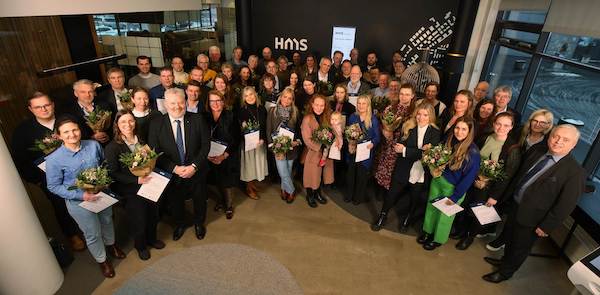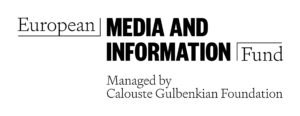🇮🇸 39 construction start-ups get sustainability grants

By Elías Thorsson
REYKJAVÍK — THIRTY-NINE Icelandic start-up and research projects have received a total of 95 million króna (€600,000) in grants from that country’s construction fund.
Founded in 2021, the fund, Askur, aims to support innovation in construction and related industries. The recipients were announced yesterday at a ceremony hosted by the ministers of infrastructure and of higher education, science and innovation.
Grants were awarded in five different categories: construction material, quality, energy efficiency and emissions, construction renovation and technological innovation.
“The fund plays an important role in supporting Icelandic innovation and research in the field of infrastructure and construction,” the infrastructure minister, Sigurður Ingi Jóhannsson, said. “Such projects will help us decrease emissions and improve living standards and our society.”
The focus this year was on environmentalism, with the fund writing that the construction industry was responsible for 40% of carbon pollution globally. According to higher education, science and innovation, Áslaug Arna Sigurbjörnsdóttir, making industries of all kinds more sustainable is vital.
“The challenges brought forth by climate change touch on all aspects of society. Such challenges demand innovation and new solutions,” she said. “We need to empower the construction industry to take steps towards sustainability.”
The fund received a total of 49 applications this year.
Grant recipients by category
Construction material
| Grantee | Project | Amount in króna |
| Kristján Friðrik Alexandersson / Gerosion ehf. | AlSiment green concrete-free adhesive anchor | 4,000,000 |
| University of Reykjavík | Environmental research on wood glue | 1,500,000 |
| University of Reykjavík | Environmentally friendly concrete | 4,000,000 |
| Eyþór Rafn Þórhallsson/ University of Reykjavík | Bláþráður — environmentally friendly improvement of concrete | 4,000,000 |
| Margrét Ormslev Ásgeirsdóttir /Rockpore ehf. | Production of tens of thousands of green construction material in the Jarðefnagarðinum industrial park | 4,500,000 |
| Neuza Isabel Da Silva Valadas / University of Iceland | Climate-sustainable cities: construction using carbon negative materials and regenerative methods | 2,500,000 |
| Gerosion ehf. | New Icelandic cement development | 4,000,000 |
| Guðni Jónsson / EFLA | Comprehensive guide to concrete factory monitoring. | 1,500,000 |
| Gústaf Adolf Hermannsson | Guide to the risks of wood glue | 2,000,000 |
| Ólafur Haralds Wallevik / Háskólinn í Reykjavík | Mineral utiliisation to decrease the carbon footprint of normal and environmentally friendly concrete | 4,000,000 |
| Anna Kristín Karlsdóttir / Biobuilding ehf. | Construction of Iceland’s first hempcrete building and the future of hempcrete. | 3,000,000 |
| Björt Ólafsdóttir / Iða ehf. | Resource circulation and decreased carbon footprint of Icelandic buildings | 1,000,000 |
| Alexandra Kjeld / Efla ehf. | The lifecycle of construction material in Iceland | 1,000,000 |
| Rósa Dögg Þorsteinsdóttir | Vistbók – database of sustainable construction material in Iceland | 1,000,000 |
| Total | 38,000,000 |
Quality
| Jónas Þór Snæbjörnsson / University of Reykjavík | Wind load concerns for building design | 5,000,000 |
| Johanna Raudsepp / University of Iceland | Where do all the happy people live? | 2,000,000 |
| Anna María Bogadóttir / Úrbanistan ehf. | Híbýlaauður | 3,000,000 |
| Anna Sigríður Jóhannsdóttir | Daylight quality in Icelandic apartments | 2,000,000 |
| Auður Hreiðarsdóttir / Esja Architecture | Hospitals in Iceland’s four farthings | 2,000,000 |
| Hannes Frímann Sigurðsson / University of Reykjavík | Analysis of low productivity in the Icelandic construction industry | 2,000,000 |
| Karl Kvaran | The role of green spaces in residential areas | 1,000,000 |
| Total | 17,000,000 |
Energy efficiency and emissions
| Jónas Þór Snæbjörnsson / University of Reykjavík | The energy consumption of buildings: optimisation and measurements | 4,000,000 |
| Eiríkur Ástvald Magnússon / Ventum ehf. | The construction of communication infrastructure in cold areas and its impact on energy usage | 2,000,000 |
| Hallgrímur Örn Arngrímsson / Verkís | Sustainable transportation of minerals in the capital region | 3,500,000 |
| Áróra Árnadóttir / Grænni byggð | The definition of carbon neutral construction in Iceland | 2,000,000 |
| Ásgeir Valur Einarsson / Iðan fræðslusetur | Building insulation testing | 2,500,000 |
| Matthías Ásgeirsson / VSÓ ráðgjöf | The benefits of improved energy consumption of older buildings | 1,000,000 |
| Valdimar Jónsson / Bjarkarlækur ehf. | Hringrásarhús — A guide to the future | 1,000,000 |
| Total | 16,000,000 |
Construction deficiencies, humidity and mould
| Veðurvaktin ehf. | Humidity damages and drenching rain in the capital region | 5,000,000 |
| Dóróthea Höeg Sigurðardóttir / University of Iceland | Moisture damage in buildings in cold climates: A literature review | 2,500,000 |
| Sylgja Dögg Sigurjónsdóttir / Efla hf. | Survey of the state of humidity in buildings and analysis of the dangers of mould | 3,000,000 |
| Sylgja Dögg Sigurjónsdóttir / SDS ráðgjöf | Air quality and air venting in elementary schools | 1,000,000 |
| Ármann Halldórsson / Mannvirkjastofa ehf. | The measuring of microbes in attic dust | 1,500,000 |
| Total | 13,000,000 |
Technological innovation
| Ásta Ósk Hlöðversdóttir / VSB Verkfræðistofa | Guide to the design of solutions to sustainable surface water challenges | 3,500,000 |
| Ásta Ósk Hlöðversdóttir / VSB Verkfræðistofa | The design and application of rainwater ditches | 2,000,000 |
| Vala Smáradóttir / Lauf | Green solutions for the construction industry | 2,500,000 |
| Jóhannes Loftsson / Breather Ventilation | The development and testing of a new ventilation system | 1,000,000 |
| Gautur Þorsteinsson / Cubit Building Company | Cubit Building Company. A new construction method | 1,000,000 |
| Auður Ástráðsdóttir | How Lean BIM cal lean to green BIM in Iceland | 1,000,000 |
| Total | 11,000,000 |
This article has been fact-checked by Arctic Business Journal and Polar Research and Policy Initiative, with the support of the EMIF managed by the Calouste Gulbenkian Foundation.
Disclaimer: The sole responsibility for any content supported by the European Media and Information Fund lies with the author(s) and it may not necessarily reflect the positions of the EMIF and the Fund Partners, the Calouste Gulbenkian Foundation and the European University Institute.
